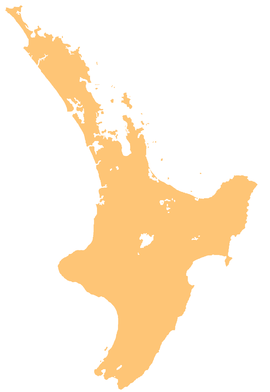The Waiwhakaiho River is a river of the Taranaki Region of New Zealand's North Island. One of many rivers and streams radiating from the slopes of Taranaki/Mount Egmont, it flows initially northeast before veering northwest to reach the Tasman Sea close to the New Plymouth suburb of Fitzroy. Near the sea, it is crossed by the coastal walkway, connecting New Plymouth with Bell Block via the Te Rewa Rewa Bridge.[1]
| Waiwhakaiho River | |
|---|---|
 Waiwhakaiho River near Fitzroy, New Plymouth | |
 Route of the Waiwhakaiho River | |
| Location | |
| Country | New Zealand |
| Physical characteristics | |
| Source | |
| • location | Mount Taranaki |
| • coordinates | 39°17′17″S 174°04′15″E / 39.2881°S 174.0707°E |
| • elevation | 2,000 m (6,600 ft) |
| Mouth | |
• location | North Taranaki Bight |
• coordinates | 39°02′14″S 174°06′26″E / 39.0371°S 174.1073°E |
• elevation | 0 m (0 ft) |
| Length | 30 km (19 mi) |
| Basin size | 136 km2 (53 sq mi) |
| Basin features | |
| Progression | Waiwhakaiho River → North Taranaki Bight → Tasman Sea |
| Tributaries | |
| • left | Kokowai Stream, Karaka Tonga Stream, Kai Auahi Stream, Mangamahoe Stream, Mangorei Stream |
| • right | Ram Stream, Camp Stream, Araheke Stream, Mangaone Stream |
| Bridges | Te Rewa Rewa Bridge |

The river is also bridged by SH3 and the Marton–New Plymouth railway line.
See also
editReferences
edit"Place name detail: Waiwhakaiho River". New Zealand Gazetteer. New Zealand Geographic Board. Retrieved 12 July 2009.
External links
editWikimedia Commons has media related to Waiwhakaiho River.
- 1:50,000 map
- water quality at 6 sites
- floods 1916 1.5m, 1971 6m, 1997–2013 stopbanks
- SH3 bridges – 1843, 1859, 1907, 2014–2015 (2016 official opening)
- photos of railway bridge 1924, 2011
- Mangorei hydro electric power station
- Meeting of the Waters Scenic Reserve walks

